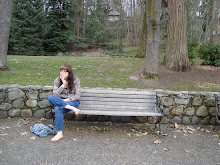Tuesday, May 12, 2009
Language Poets
I have always been interested in language poetry. There are so many weird poets experimenting with the English language. The first poet I read was Susan Howe. The first poem I read was "Speeches at the Barriers". I have no idea what the poem is about but the language is so beautiful. She used a lot of the same consonants. She used a lot of "f"s, "s"s, "g"s and "w"s. When read out loud, the words seemed like a tongue twister. I would like to know why she used so many similar consonants. Maybe the effect of using the words was for the use of the reader to actually read the poem out loud and not so much to read to his or herself. One of the most compelling lines in her poem is in part one stanza six: "old woman prowling genial telling her story". The image I got from the line was the woman from Mary Poppins. The woman who is feeding the birds. This woman has a story to tell and it is an interesting story. From far away, she looks old but from close up she has beauty in her past. In White Foolscap, Howe is playing with the way she ranges her poems. I prefer the poems not to be crazy positions because it seems to busy for my brain to concentrate. There were two poems that I actual preferred. The poem started with "Running ring" was actually very interesting. The poem is about a wren and her child but the way the poem is formed makes me wonder why she did that. The poem is in a "s" shape. She rhymes and uses alliteration to make her point. The second poem is underneath the "Running rings" poem and most of the words are combined with other words. I did not realize the poems were under one poem called "White Foolscap". I do like the repeating of "I can retrac my steps I who crawl between thwarts Do not come down the ladder i for I haveaten it a way". Susan Howe combines words for emphasis. For an example of her combining words "re trac Iwho haveaten". I have no explanation for why she did that but when I read the words out loud I started to realize the sounds of the words. By using field composition, Susan Howe makes the reader realize the most important aspect of poetry, the words. Lyn Hejinian I like and dislike. Her poetry scheme is a new technique called "the new sentence". "The new sentence" is combining sentences that do not have any connection to any of the sentences. I read Lyn Hejinian's "My Life" fall term and I struggled to understand the concept. I like the way she wrote "My Life". I like actually using the concept of "the new sentence" for good use. When I actually tried the concept I guess I misunderstood and messed up the poem. I like that I have more of a chance to explore more strange and unusual concepts.
Subscribe to:
Post Comments (Atom)

No comments:
Post a Comment